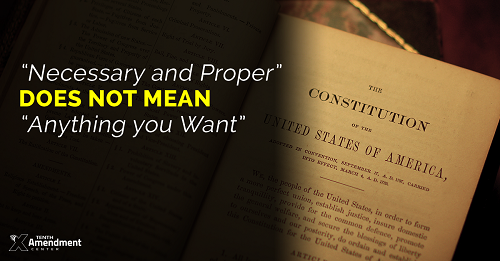“10 Minutes Closer to Freedom”
I this episode of Thoughts from Maharrey Head, I talk about the Constitution’s necessary and proper clause. Hint: it doesn’t mean anything and everything.
Politicians and legal academics often call the necessary and proper clause the “elastic clause” because it supposedly expands the powers of the federal government. In fact, the way many judges and public officials utilize the clause, we would more aptly call it the “anything and everything clause.” But members of the founding generation from Thomas Jefferson to Alexander Hamilton insisted that the necessary and proper clause did not expand federal power one iota.
So, what was the original intent of this oft-misunderstood legal clause? In this episode of Thoughts from Maharrey Head, I did into the proper meaning of necessary and proper, explain why it was included and show that it was never meant to expand federal power.
As a bonus, I also give you my two-cents worth on the Republican National Convention.
You can subscribe to Thoughts from Maharrey Head for free on iTunes. Just click HERE.
SHOW NOTES AND LINKS
Thoughts from Maharrey Head #48: The Constitution and General Welfare
The Original Constitution: What It Really Said and Meant
“It may be affirmed with perfect confidence that the constitutional operation of the intended government would be precisely the same, if these clauses were entirely obliterated, as if they were repeated in every article. They are only declaratory of a truth which would have resulted by necessary and unavoidable implication from the very act of constituting a federal government, and vesting it with certain specified powers.” – Hamilton Federalist #33
“Suppose it had been inserted at the end of every power, that they should have the power to make laws to carry that power into execution; would this have increased their powers? If therefore it could not have increased their powers, if placed at the end of each power, it cannot increase them at the end of all. This clause only enables them to carry into execution the powers given them, but gives them no additional power.” – George Nicholas, Virginia ratifying convention




